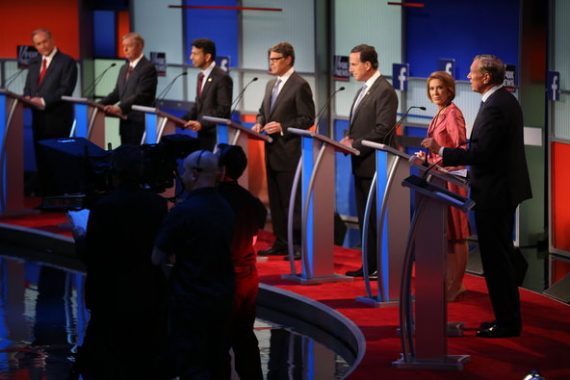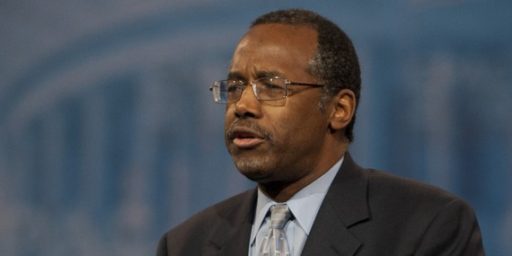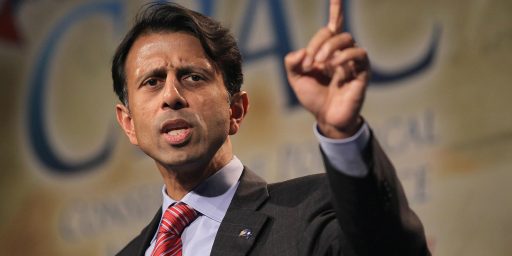Fixing the Debates
Everyone is sick of the current approach. The candidates are looking for a new one.
With viewers and candidates alike frustrated by the processes surrounding and format of the Republican presidential debates, calls for immediate reform are growing. Indeed, both front-running and non-factor candidates are pushing to do something, POLITICO reports.
Republican presidential campaigns are planning to gather in Washington, D.C., on Sunday evening to plot how to alter their party’s messy debate process — and how to remove power from the hands of the Republican National Committee.
Not invited to the meeting: Anyone from the RNC, which many candidates have openly criticized in the hours since Wednesday’s CNBC debate in Boulder, Colorado — a chaotic, disorganized affair that was widely panned by political observers.
On Thursday, many of the campaigns told POLITICO that the RNC, which has taken a greater role in the 2016 debate process than in previous election cycles, had failed to take their concerns into account. It was time, top aides to at least half a dozen of the candidates agreed, to begin discussing among themselves how the next debates should be structured and not leave it up to the RNC and television networks.
The gathering is being organized by advisers to the campaigns of Donald Trump, Ben Carson, Bobby Jindal and Lindsey Graham, according to multiple sources involved in the planning. Others who are expected to attend, organizers say, are representatives for Carly Fiorina, Mike Huckabee, Rand Paul, Marco Rubio and Rick Santorum. The planners are also reaching out to other Republican candidates.
It’s telling that not only are the three leading candidates apparently frustrated with the current process but they’re meeting with representatives from those currently at the “kids’ table.” One would think Trump, Carson, and Fiorina would want to winnow the field so that it’s only the top five or six candidates on the stage, not figure out how to give Santorum, Jindal, and Graham a better shot. Presumably, then, the concern of the frontrunners isn’t fairness and inclusion so much as the circus created by the minor television networks trying to create a spectacle out of the event.
Still, figuring out a solution that’s better for all concerned would seem to be an impossible task.
Figuring that out could be contentious as each campaign has a number of different complaints about the process. Some — such as Bush and Paul — have griped about unequal speaking time. Others have complained bitterly about how polling is used to determine who qualifies for the prime-time and undercard debates. Some have insisted on giving opening and closing statements, despite the networks’ desire to have the candidates spend as much time as possible clashing with each other on stage.
Jindal, who polls better in Iowa than he does nationally, has argued that criteria for determining who qualifies for debates should be based on early state polling, not just national surveys.
“Our continuous complaint is candidate exclusion and the delusional debate polling criteria. It’s unacceptable,” said Gail Gitcho, a Jindal spokeswoman. “Maybe this meeting will change that, maybe it won’t. But we aren’t going to shut up about it.”
Graham’s campaign has argued that there should be two debates — with two groups of seven or eight candidates selected randomly.
Carson said on Thursday that he had asked his staff to contact other campaigns to propose format changes, without sharing specifically what he thinks those changes should be.“It’s not about me and gotcha questions. It’s about the American people and whether they have the right to hear what we think,” Carson said before an event at Colorado Christian University. “The whole format was just craziness … You got to be really bad for the whole crowd to boo you.” ”I think the families need to get together here, because these debates as structured by the RNC are not helping the party,” Carson campaign manager Barry Bennett told the Washington Examiner. “There’s not enough time to talk about your plans, there’s no presentation. It’s just a slugfest. All we do is change moderators. And the trendline is horrific. So I think there needs to be wholesale change here.”
Rubio, largely considered the standout of Wednesday’s debate, said the questions from CNBC’s moderators “became irritating” as the night wore on. ”I think the bigger frustration you saw is that all those candidates onstage had prepared for a substantive debate. Everyone was ready to talk about trade policy and the debt and tax policies,” Rubio said on Fox News. “And we’re ready for that, everybody was. And then, you got questions that everyone got, which were clearly designed to get us to fight against each other or get us to say something embarrassing about us and then get us to react.”
Now, it’s debatable how much the candidates wanted to talk about substantive issues. And, certainly, “gotcha” questions aren’t new or unique to the abominable hosts of CNBC. The “What if your wife were raped?” question posed to Mike Dukakis in the 1988 general election debates come to mind. Still, the Fox and CNBC debates, in particular, seemed very much about drawing attention to the moderators and their network vice helping Republican primary voters decide which of the multitude of candidates was best suited to carry their party’s banner in the 2016 election.
PowerLine’s Steven Hayward has some intriguing ideas for reform which, ironically, have the RNC at their center.
First, cancel the rest of the debates. Instead, announce that the RNC will host the debates and pick the panel of questioners. Allow any news organization that wishes to broadcast it. Most of the cable nets will do so, but who cares if they don’t. Panelists should be party elders, such as Newt Gingrich, Bill Armstrong, and Mitch Daniels (who will be sure to ask hard questions on policy), or serious journalists of the right, like George Will.
Second, given that so many voters these days are independents, why not have debates that mix up the candidates from both parties. How about a debate that draws six candidates (three from each party) by lot, and throws them all together during the primary season. Wouldn’t it be fun as well a clarifying to see Rand Paul and Bernie Sanders on the same stage, not to mention Carly and Hillary.
Bonus idea: Since conservatives like competition, how about if Trump, Cruz, Rubio and one other announced they they were not only boycotting the next debate, but would set up a rival debate at the same time period, offering it to C-SPAN and several conservative websites to broadcast on streaming video. They could give their slots up to Pataki, Graham and other “undercard” candidates. And then let’s see who watches which debate.
While I find the notion of mixed-party debates intriguing and think they would be very useful in terms of informing voters and shaking up the process, they’re something we should do in the off years. It’s reminiscent of the old Firing Line debate specials that PBS would air every few months and a really good way to think through public policy ideas. But the objective at this juncture is to help the parties find their nominee; that’s accomplished by having intramural exchanges.
I very much like the idea of taking it away from the networks. Fox is the most Republican-friendly but they nonetheless did an awful job with the first debate. Gingrich, Will, and company would indeed be more likely to ask substantive questions to help separate the field.
Further, while there are simply too many candidates in the current field, most of whom seem obviously to have no shot at the nomination, it’s fundamentally problematic to exclude conventionally qualified candidates—former and sitting governors and senators—on the basis of poll numbers months before the first primaries and caucuses. So, a creative approach such as competing debates or Graham’s idea of two randomly-assigned smaller debates vice the current main and ancillary debate has some appeal.
While getting the candidates, who have different agendas and concerns, on board with a new process at this juncture will be difficult, all should be able to agree that we need better moderators and fewer candidates on the stage at one time. Taking it out of the hands of the networks and putting it into the hands of the candidates or the party makes abundant sense, especially during primary season. Two debates of seven candidates makes more sense than two debates of ten and four. Or, hell, have more frequent debates and rotate among fields of four or five. CSPAN and PBS would run them even if the for-profit networks balked.





“Panelists should be party elders, such as Newt Gingrich, Bill Armstrong, and Mitch Daniels (who will be sure to ask hard questions on policy), or serious journalists of the right, like George Will.”
Ignoring the issue of how serious a journalist Will is (climate change denial, anyone?), this idea seems destined to pull the primary process further to the extreme, as the questions will likely come from a party perspective, rather than making the candidates more attractive to independents and moderates.
Better candidates
You front pagers need to coordinate your posts. This post stepped directly on Doug’s post on the same topic :-).
@Moosebreath:
Yeah, I used to like George Will but he has pretty much become a crotchety old hack yearning for the good old days of Saint Ronaldus.
Serious questions on policy from Newt Gingrich? LMAO.
Jesus, just hire some hacks to write up a five-month pilot with different candidates rising and falling, and offer the victor’s role to the highest bidder. Take your pick: Crazy Southerner, War Man, All-Caps Chain Email from AOL Account, Saint Holiness, Token Minority, Billionaire with Ideas of Interest, Dutiful Boy, Very Large Corrupt Adult, Flinty Businesswoman.
As I said in Doug’s post the debates have become nothing but reality TV shows. Just do away with them.
The debates aren’t the problem.
In the RCP average, Trump is at 26.8%, Carson at 22%, Rubio at 9.3%, Cruz at 7.3%, Bush at 6.8%, and Fiorina at 6.3%.
Pollster has Trump at 31.8%, Carson at 22.9%, Rubio at 7.8%, Bush at 7.7%, Cruz at 5.4%, and Fiorina at 4.2%.
64% of Republicans in the Senate voted against the budget deal.
68% of Republicans in the House voted against the budget deal.
The state of the debates is a symptom.
The current state of the GOP is the illness.
Fix that, and the debates would fix themselves.
Slapping a bandage on the debates would not accomplish anything.
It’s funny…after the first debate, the establishment GOP wrote off Trump because he was mean to Megyn Kelly because she asked him questions. Of course, that didn’t work. Nothing has changed except that all of the candidates are following Trump’s lead. And the GOP media is falling right in line, because they’re terrified about how replaceable they are.
Let’s face it–if Jeb Bush had come out of this debate on fire like a meteor and the rest of the nutso field had ranted and lied when they were asked questions, the spin would be so different coming from James and Doug.
As I said in my post earlier, the idea of some kind of multi-stage debate format like the one that Power Line discusses, I’m not sure we’re at the point now where it makes sense to implement it.
For one thing, I’m not sure the networks will be willing to give up the air time that more than one prime time debate at a time would require. Second, deciding who participates in which debate would seem to inevitably end up being kind of arbitrary. And, finally, I’m not sure how much patience voters and viewers would have for such a thing. The fact that there was a World Series game on Wednesday likely reduced the total audience for the CNBC debate, but one gets the impression that we’re also at the point where the novelty — i.e., Donald Trump — is wearing thin.
Reducing the participants on the main stage certainly seems like a good idea, as I said, especially now that we’re getting close to the time when actual voting will take place. Someone needs to break it to Lindsey Graham, Jim Gilmore, George Pataki, Bobby Jindal, Rick Santorum, and yes even candidates like Mike Hucakbee, Rand Paul, and Chris Christie that unless they can demonstrate some higher level of support they really can’t be considered to be in the same category as the guys at the top of the field or contending to get there.
There’s a contrarian take: the problem is not with the debate format or the moderators, but the freakish Republican field this year.
Consider what happened with the Democrats. Five candidates ran this year, each of whom were minimally qualified to run for President. After a reasonable time testing the waters, the two no hopers dropped out, leaving three candidates who are objectively speaking, solid candidates for the Democratic Presidential nominee. There has been no complaint about the debates, either the format, the questions or the moderators, despite the fact that Anderson Cooper questioned Clinton aggressively. The only complaint I have heard from some Democrats is that there are too few debates.
Contrast that with the Republican side. Why haven’t all the no hopers dropped out there? Alternatively, why is the Republican field dominated by a pair of unqualified demagogues?Really those are the questions that need to be addressed, rather than focussing on tweaking the debate process.
Forget about the moderators. How about the candidates asking each other questions? They could sit in a circle and, through some rotation scheme, interact with each other. May be more enlightening. Or it could degenerate into a circular firing squad. Either would be all right with me.
I….agree with Lindsey Graham.
And now here’s Ted Cruz’s take on fixing the debates:
Good idea, dude!
I used to think well of George Will but he had a stroke or something and is now a climate-change-denying idiot..
Each no-hoper has his own billionaire backer hoping to buy some influence, and/or wants to fluff his own image and book sales. Each network wants to put on a reality show to pump ratings. Each moderator is a careerist wanting to fluff their own image (although some fail badly). It’s laissez faire, baby. Why do conservatives hate free enterprise?
Snark, but it leads to a thought. Restrict moderators to “made men” journalists and maybe elder statesmen. People approaching retirement with secure reputations. (But not Will and Gingrich, please. Show some decorum.) And as suggested above, the RNC hosts and offers it to anyone who want’s to carry it.
It takes a special kinda person to see Exxon and the Kochs on one side, and the global scientific community on the other side, and conclude: “Those greedy scientists are lying!”
Haven’t read the article or comments yet, and I’m not in a television, legislative or political career so I don’t know if this is completely unworkable or what), but it seems to me that if the candidates don’t like something about the debates setup by, hosted by, and PAID FOR by the media, they could dip into their own campaign coffers and host their own goddamned debates, using whatever format they like, with whatever moderators they like, for as long as they like, with whichever opponents they like.
They could even shell out the dough to buy time on one or more major networks if they want to make sure it gets televised.
Beyond that? Fark ’em – If they don’t like the way a a particular debate is being held, they’re welcome to give it a pass
If you don’t want crazy questions that don’t have crazy positions.
How can you have a serious discussion on immigration when the leading candidate is pushing the idea of a Game of Thrones-style wall and deporting 10 people every minute, of every hour, 24 hrs a day, 365 days a year, for two years (roughly 10 million people).
@steve s: True story. I don’t know if you’re familiar with Gary Wills. Excellent writer. Trained as a Jesuit, and it shows. Well researched work with obsessively logical analysis. First time I ever read a George Will column, longer ago than I’ll admit to, was because I glanced at and thought the byline was Gary Wills. About three paragraphs in I’m going, ‘WTF, Wills get early Alzheimer’s or something?’ Will just wasn’t making any sense. And hasn’t much since. He did get a LOT richer. As a pundit you don’t get rich for insightful analysis. You get rich by telling people what they want to hear.
Now here is the TRUTH:
RTWT. It gets better.
@stonetools: Nobody else was writing a post on this when I started this one but I got sidetracked with work duties midway through and finished a few minutes after Doug posted his. The posts were sufficiently different to just leave them up rather than trying to turn this into an update to Doug’s post, which I’ve done sometimes when this happens.
@James Joyner:
Cool. I was just having a bit of fun. Do whatever. :-).
@stonetools: While the Republican position here is that the main difference is a biased media, I think it’s just a function of different fields The Democrats aren’t really having a primary process. Hillary Clinton is going to be the nominee and some other dudes wanted to get some air time to argue alternative positions. The Republicans are the extreme opposite: no one has any idea who the eventual nominee will be, so there’s no reason for anyone to drop out. Few of us think the current frontrunners are plausible nominees and there’s very little polling difference between the top tier also-rans (Bush and Rubio) and the bottom tier (Graham and Jindal) so no obvious reason for anyone to pull out.
Maybe next they will have Jay Leno, David Letterman, and Jerry Seinfeld as hosts.
These debates are set up, scripted, orchestrated, and choreographed. They are used as a diversion from the real issues and events. They are used to keep the people in the dark.
@James Joyner:
You may be right concerning the current Democratic primary, but if you compare the current Republican field to the Democratic primary field of 2008 ( or even to the Republican primary field of 2008, the current Republican field still looks freakish.
Regardless, it does not refute my point that current debate problems really stem from the outlandish nature of the current Republican primary field. A “typical” Republican primary field would not have these problems (although there would be complaints about ‘liberal media bias’ . That’s a perennial).
Yes!!. Make them dance!
@James Joyner:
And for months we’ve been waiting for the implosion. Yet it hasn’t come, not even close.
Perhaps having a Trump or Carson win the nomination will finally convince you that if you want to save your party “fixing” debates is not the issue.
Honestly, it’s not like you couldn’t see this coming. You put Sarah Freakin Palin on the ticket as VP!
If this phenomenon blindsided you it’s only because you’ve been blind for a long time James.
@Davebo: Sarah Palin was a desperation move that I opposed. But she was a sitting governor and dynamic speaker. Team McCain did a lousy job of vetting her but didn’t pick her as a whackadoodle. And, again, the GOP nominating electorate has continually bypassed extreme candidates for the likes of “compassionate conservative” Bush, McCain, and Romney. I continue to think that they’ll ultimately choose someone relatively mainstream, likely Jeb or Rubio, rather than Trump, Carson, or Fiorina.
@Doug Mataconis: “I’m not sure the networks would be willing to give up the air time…” That’s an argument pulled out every couple of years that totally drives me nuts. (Yes, very short trip…) The airwaves are not a property of the networks; they — in effect — RENT the spectrum from you and me. Take them back. Require a renter of spectrum to donate a percentage of the time ‘on the air’ to national causes. (Hell, I’d make them present real culture programming, too! But that’s just crazy Grampa John talk.)
@JohnMcC: I don’t think that argument makes much sense in the modern communications environment. The cable networks now dominate news coverage and the don’t broadcast over the public airwaves but rather over essentially infinitely expandable bandwidth. And the regular broadcast networks haven’t broadcast the debates in years.
I’d also point out that the R-candidates action in combining to oppose the RNC is an amazing and pivotal event. The correct answer to the Poli-Sci test question: ‘What is a political party” back in the last century was “An organization devoted to successfully elect it’s adherents to political office.’
The candidates themselves are saying that the RNC has outlived it’s usefulness. Perhaps during an actual campaign season this might have some validity. Looking at the R-party electoral screw-ups in recent campaigns (unable to count ballots in several state primaries in ’08) I could concede the point.
But what is going to happen after the election? The institution of the RNC will be significantly weakened — unless a Repub wins and makes a Presidential project of reinvigorating the party apparatus.
I think the so-called-conservative “movement” has just delivered a probably fatal blow to the institutional Republican Party. Remember that cliche about the ‘curse’ of living in ‘interesting times?’
@Moosebreath: The format should be a call in from the people.
@James Joyner: Thanx for the reply! Probably you are correct that the idea of actually taking spectrum back from a corporation that has purchased it’s use seems so outlandish in this present moment that only some bald-headed old crazy guy would think of it.
If you think that choosing our next President is of sufficient national importance that informed voting is a big priority in a multi-cultural democracy united principally by it’s electronic media…. Well, maybe less crazy?
A ‘tax’ of ‘in kind’ contributions (taxing the media corporations air-time in lieu of money) does not seem philosophically weird. The weirdness comes from imaging a Gov’t willing to require it and a corporation willing to pay it. It would have seemed equally weird to require John D Rockefeller to maintain environmental standards during the ‘Gilded Era’. Today, we take it for granted because such things affect us all.
@JohnMcC:
You are completely missing the point. Even if your “airwaves are owed by the public” argument meant that networks could be forced to carry debates — which it does not — the fact of the matter is that the vast majority of the primary debates in both parties are being covered by cable networks, not broadcast networks. They are not covered by the “airtime” rule you cite.
I’d also note that it has generally been the rule that all of the networks — broadcast and the three cable news networks — provide full coverage to all of the General Election Debates. The main reason for that, of course, is that the debates are being staged by the Commission on Presidential Debates rather than the networks or other sponsors.
To get back to the original point, though, I’m still not convinced that the two-part debate idea — which is largely only even relevant because of the unusually large size of the Republican field this year — is a good idea regardless of whether its covered by a cable network or CBS, NBC, or ABC.
@Doug Mataconis: AARGH! Should have thought of the difference between the ‘heritage’ broadcast vs cable. Thanx for pointing that out.